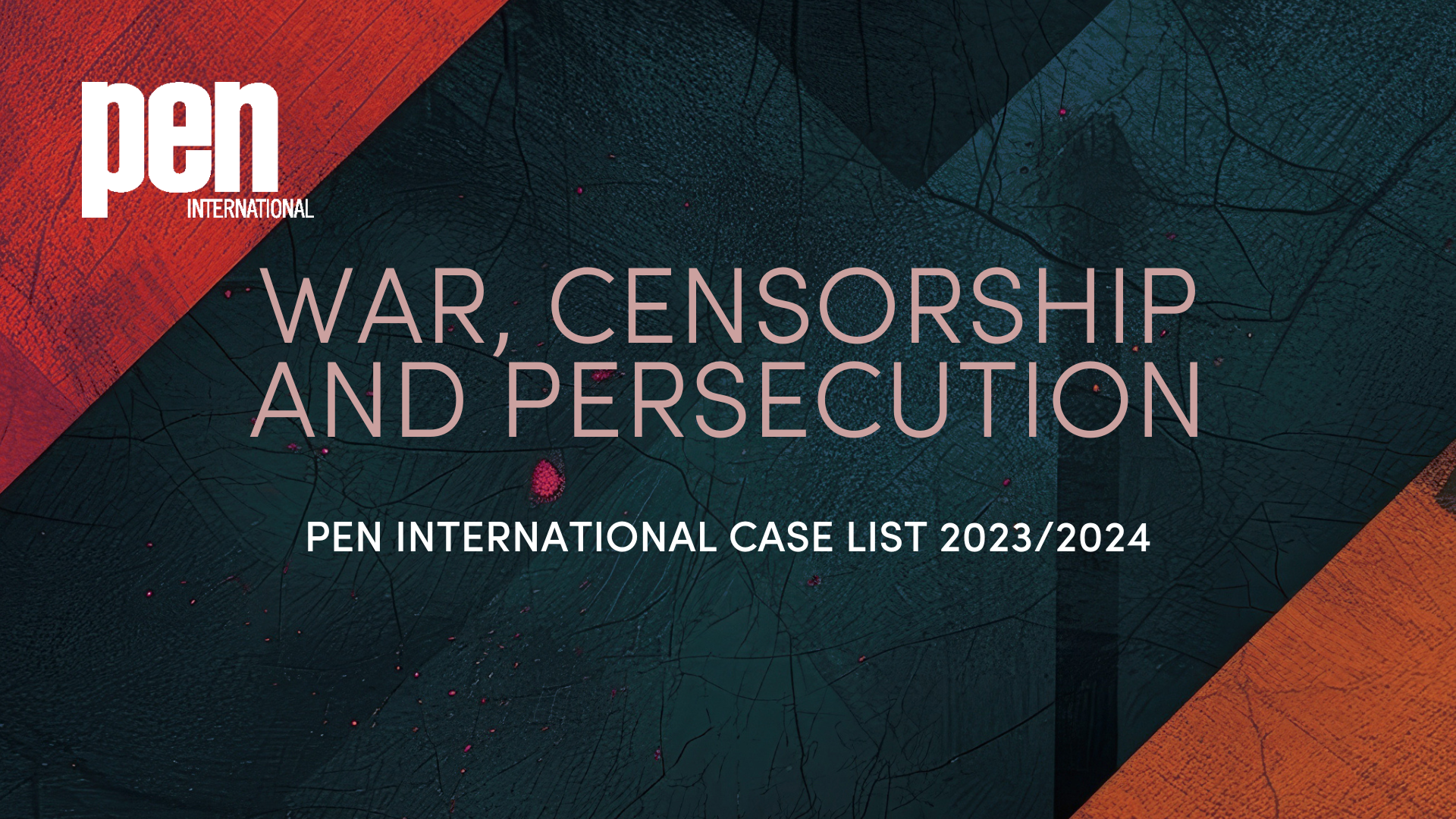PEN International Case List 2023/2024: Unveiling the Persecution and Censorship of Writers Amid War
“The role that writers can play in times of uncertainty, diligently curating narratives to nourish empathy, encompassing glimpses of joy and ultimately offering the gift of hope, lacks formal recognition, and this lack of acknowledgement or coherent protections can ultimately decimate expression and propel rampant self-censorship.” Ma Thida, Chair of PEN International’s Writers in Prison Committee
21 March 2024: On World Poetry Day, PEN International releases War, Censorship, and Persecution: PEN International Case List 2023/2024, highlighting challenges for writers in global conflicts and emphasizing the need to safeguard freedom of expression, especially in war-torn regions.
War, Censorship, and Persecution documents 122 cases of writers facing harassment, arrest, violence and even death worldwide. These include 26 people imprisoned, 23 detained, 22 harassed, 14 on trial, 8 killed, and 6 facing judicial harassment and death threats, among others. The breakdown by region shows Africa with 14 cases, the Americas with 36, Asia/Pacific with 24, Europe and Central Asia with 32, and the Middle East and North Africa with 16.
In 2023, global censorship persisted amidst escalating conflicts. In Europe and Central Asia, the report addresses the continued war of aggression of the Russian Federation against Ukraine, emphasizing the impact of armed conflicts on the writing and artistic communities. Renewed tension endangered peace and stability in the Western Balkans, where writers faced a range of challenges aimed at silencing their opinion and critical reporting.
In the Middle East, armed conflict intensified with events such as the 7 October attack by Hamas on Israel, which had catastrophic consequences. Israel launched a brutal bombing campaign that to date has killed more than 30,000 Palestinians in Gaza, leading to the risk of genocide, and a spill over into other parts of the region. The war in Gaza proved to be the deadliest conflict for writers in recent history, with 68% of all journalists killed worldwide in 2023. In Yemen and Syria, ongoing conflicts continue to take a toll on free expression: Houthi authorities escalated repression, while Syria maintained repressive laws and thousands remained forcibly disappeared.
In Sub-Saharan Africa, Sudan experienced major escalations due to a power struggle between the Sudan Armed Forces and the Rapid Support Forces, raising fears of another genocide in the Darfur region. Meanwhile, in the Democratic Republic of Congo, armed conflict over mineral resources persisted, with several non-state militias and rebel groups involved. A new conflict emerged in Ethiopia between federal government forces and Amhara militia allies following tensions stemming from a peace agreement that ended the previous Tigray war.
PEN International condemns attacks on writers and civilians caught in conflicts, mourning the loss of prominent cultural figures, including PEN Ukraine member Victoria Amelina.
In Asia, the report highlights the crackdown on writers and journalists in countries such as Myanmar, India and China, where 11 members of the Independent Chinese PEN Centre endure long-term imprisonment, along with the persecution of minority writers from the Uyghur and Dalit communities, among others. Women writers experienced severe challenges, notably in Afghanistan, where under Taliban rule, writers and advocates for girls' education face prolonged arbitrary detention.
In the Americas, targeted killings of journalists by criminal gangs raised concerns in Haiti, Colombia, Mexico, Honduras, and Guatemala. In Cuba, numerous artists faced persecution for their creative expression, lacking due process and independent legal defence. Meanwhile, in Nicaragua, the report documents a new type of persecution in the form of ‘civil death’ where citizens deemed to be ‘traitors’ were stripped of their citizenship.
Globally, book bans are on the rise, threatening education and fostering discrimination, justified by national security concerns in Belarus, Hong Kong, El Salvador, Hungary, Russia, and Türkiye. In Brazil and the USA, bans often stem from discriminatory views, leading to the removal of classic titles from public libraries and schools.
In 2023, PEN International, the PEN Emergency Fund and partner NGOs provided crucial aid to writers and their families, including emergency relocation and financial support; notably, 22 grants assisted writers from Afghanistan, 14 from Nicaragua, and others from Myanmar, Türkiye, Belarus, Serbia, Cuba, Honduras, Egypt – to name a few – underscoring the ongoing need for such assistance and the importance of fundraising for future aid.
PEN International makes the following recommendations to the international community:
· To foster peace
· To protect writers
· To enhance the cultural role of minoritized communities
· To promote and protect women writers
PEN International’s advocacy and campaigning will continue through 2024 and beyond to seek an end to these human rights violations, provide and support protection and systems of refuge that can help support writers to continue their essential work, and to seek redress for harms suffered.
Notes to editors:
For further information or media inquiries, please contact Sabrina Tucci, Communications and Campaigns Manager, [email protected]
PEN International’s small team works tirelessly to bring these cases to light.
Become a Friend of PEN International today, help us continue this vital work.


